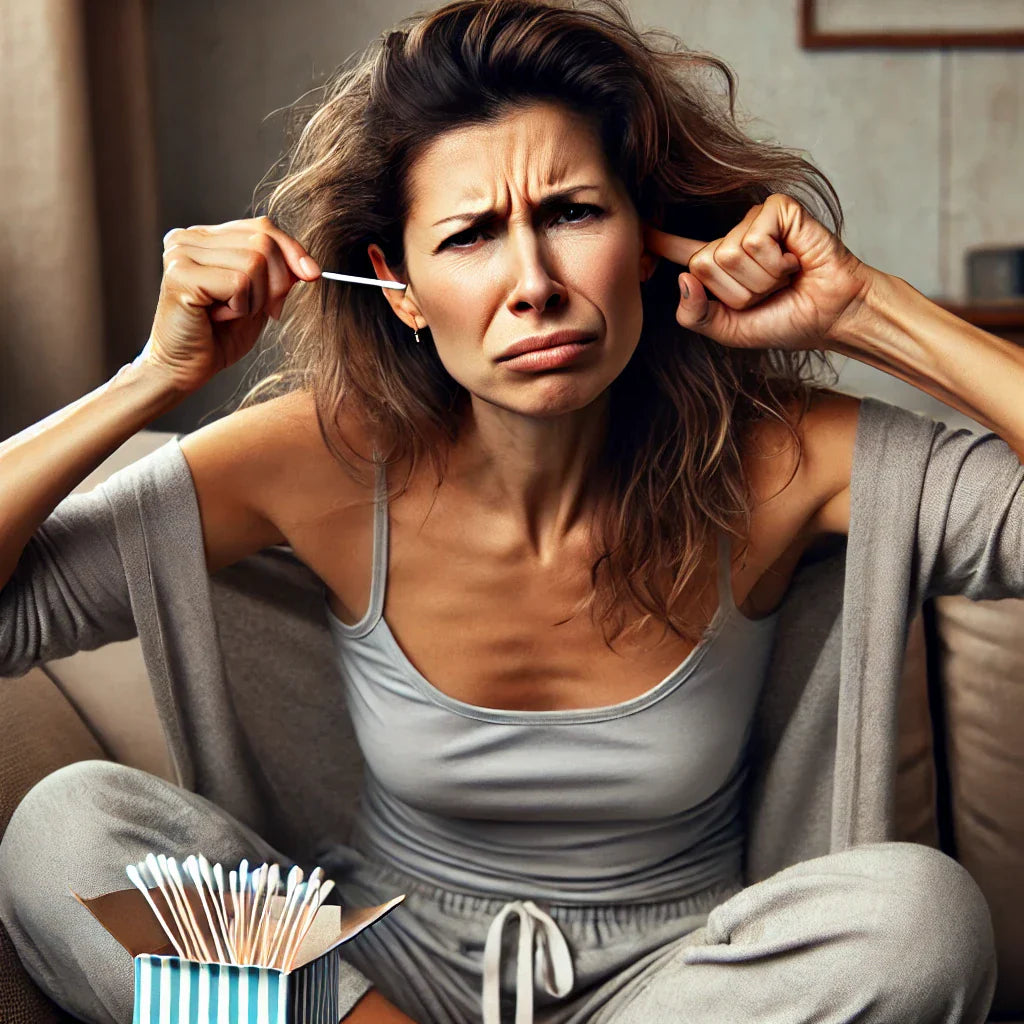
Perimenopause and Itchy Ears: The Most Annoying Symptom of Perimenopause?
Share
If you find yourselves never within arms reach of a Q-tip to relieve itchy ears during perimenopause, you’re not imagining things—and no, it’s not because you forgot to clean your earbuds. Itchy ears might not be the most talked-about symptom of perimenopause (hot flashes and mood swings tend to steal the spotlight), but it’s surprisingly common.
Let’s dive into why your ears have you losing your mind during this time, and more importantly, what you can do to soothe them at home.
Why Does Perimenopause Cause Itchy Ears?
Perimenopause, the transitional phase before menopause, comes with a rollercoaster of hormonal changes. These fluctuations, particularly in estrogen levels, can affect your body in unexpected ways—including your skin, which also includes the delicate skin inside your ears.
Here’s how it works:
- Dry Skin and Dehydration: Estrogen helps maintain skin hydration and elasticity. When estrogen levels drop, your skin can become dry and itchy—this includes the skin in and around your ears.
- Increased Sensitivity: Hormonal shifts can make your skin more reactive to environmental irritants, such as allergens, perfumes, or even the material of your earrings.
- Wax Build-Up or Drying Out: Changes in your body’s oil production can affect earwax consistency, leading to dryness or itchiness.
- Stress Factor: Let’s not forget that perimenopause often comes with increased stress, which can exacerbate skin sensitivity and itchiness.
The result? An incessant urge to scratch that can drive you up the wall—but don’t worry, relief is within reach.
How to Relieve Itchy Ears at Home
The good news is that most cases of perimenopause-related ear itching can be managed with simple, at-home remedies. Here are some tried-and-true strategies to soothe the itch:
1. Keep Your Ears Moisturized
Dryness is one of the main culprits behind itchy ears, so keeping the skin hydrated is key.
- Use a few drops of mineral oil, olive oil, or coconut oil to gently moisturize the ear canal.
- Apply a fragrance-free, hypoallergenic moisturizer to the outer ear if the skin feels dry or flaky.
Pro Tip: Avoid inserting anything (like Q-tips) into your ear canal to prevent irritation or damage.
2. Stay Hydrated
Hormonal changes can dehydrate your skin, so drinking plenty of water can help combat dryness from the inside out. Aim for at least 8 glasses a day, and consider adding a hydrating, caffeine-free tea like chamomile or peppermint for a calming boost.
3. Use a Gentle Cleanser
Avoid harsh soaps or cleansers that can strip the natural oils from your skin. Opt for a pH-balanced, unscented cleanser when washing around your ears.
Pro Tip: Rinse thoroughly to avoid leaving residue that could further irritate the skin.
4. Avoid Common Irritants
Pay attention to potential triggers, such as:
- Allergens: Dust, pollen, or pet dander can exacerbate itchiness.
- Jewelry: Nickel in earrings can irritate sensitive skin—choose hypoallergenic materials like gold or titanium.
- Hair Products: Hair sprays, shampoos, and conditioners that contain harsh chemicals can sometimes trigger itchiness if they come into contact with your ears.
Switching to gentle, hypoallergenic alternatives can make a big difference.
5. Soothe with Cool or Warm Compresses
For immediate relief:
- Apply a cool compress (a clean, damp cloth) to reduce inflammation and soothe the skin. Or finish your warm shower with a ice cold rinse to reset your nerve endings.
- Alternatively, use a warm compress to soften dry skin or earwax buildup.
Pro Tip: Always use clean materials to avoid introducing bacteria into your ears.
6. Boost Your Diet with Skin-Friendly Nutrients
What you eat can impact your skin’s hydration and resilience. Include foods rich in:
- Omega-3 fatty acids: Found in salmon, walnuts, and flaxseeds, these help reduce inflammation and promote healthy skin.
- Vitamin E: Avocados, almonds, and sunflower seeds are great sources of this skin-loving nutrient.
- Collagen-building nutrients: Include foods rich in vitamin C (citrus fruits, bell peppers) and zinc (pumpkin seeds, chickpeas).
7. Try an Anti-Histamine (Flonase for example)
Add to a Q-tip and gently rub it on your inner ears. DISCLAIMER: do so at your own risk and be sure to not go to deep in order to avoid damaging your ear canal.
When to See a Doctor
While itchy ears are usually harmless, there are some instances where it’s best to consult a healthcare professional:
- If you notice pain, discharge, or hearing loss along with the itchiness.
- If over-the-counter remedies don’t provide relief.
- If you suspect an infection or severe allergic reaction.
A doctor can check for underlying issues, such as eczema, psoriasis, or an ear infection, and recommend treatments like prescription creams or antihistamines.
Final Thoughts: Scratch Less, Smile More
Itchy ears during perimenopause might be one of those odd, under-the-radar symptoms, but it’s also manageable with a little care and attention. Remember: hormonal changes don’t have to dictate your comfort. By staying hydrated, moisturizing, and avoiding common irritants, you can give your ears the TLC they deserve.
So, next time your ears start itching, ask yourself: What’s one simple thing I can do today to make myself more comfortable?
Because your health journey is all about progress—not perfection. 🌿
